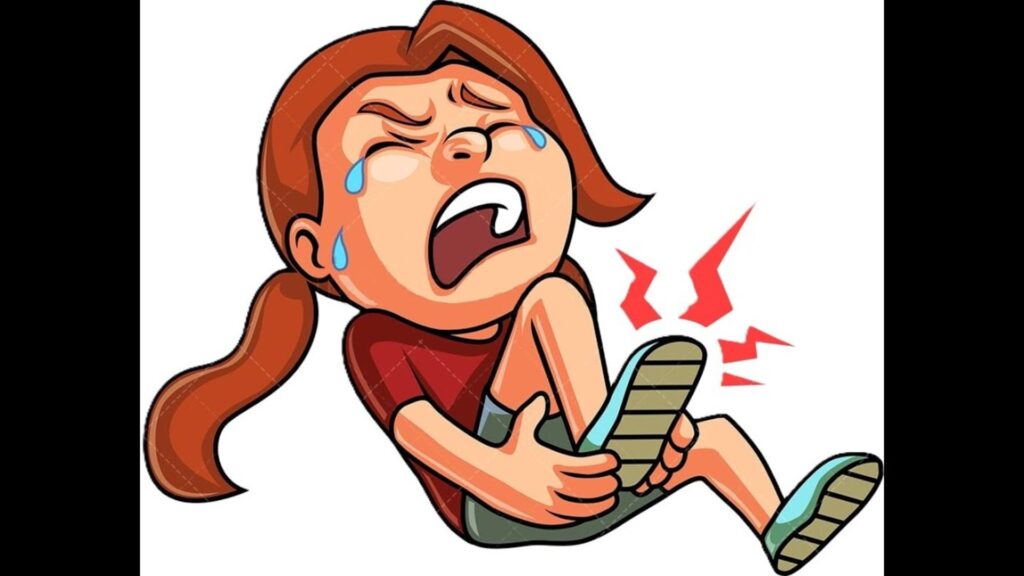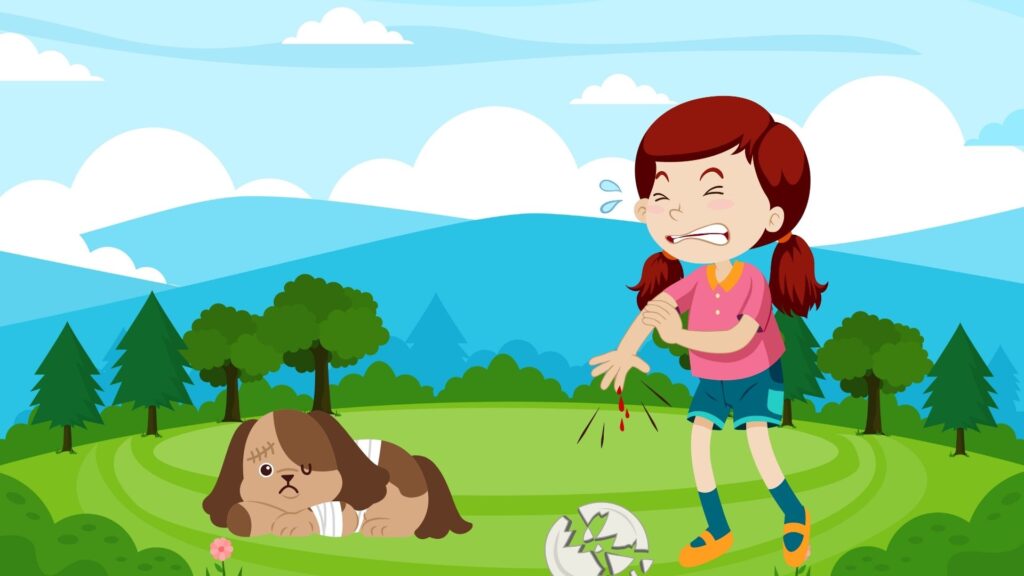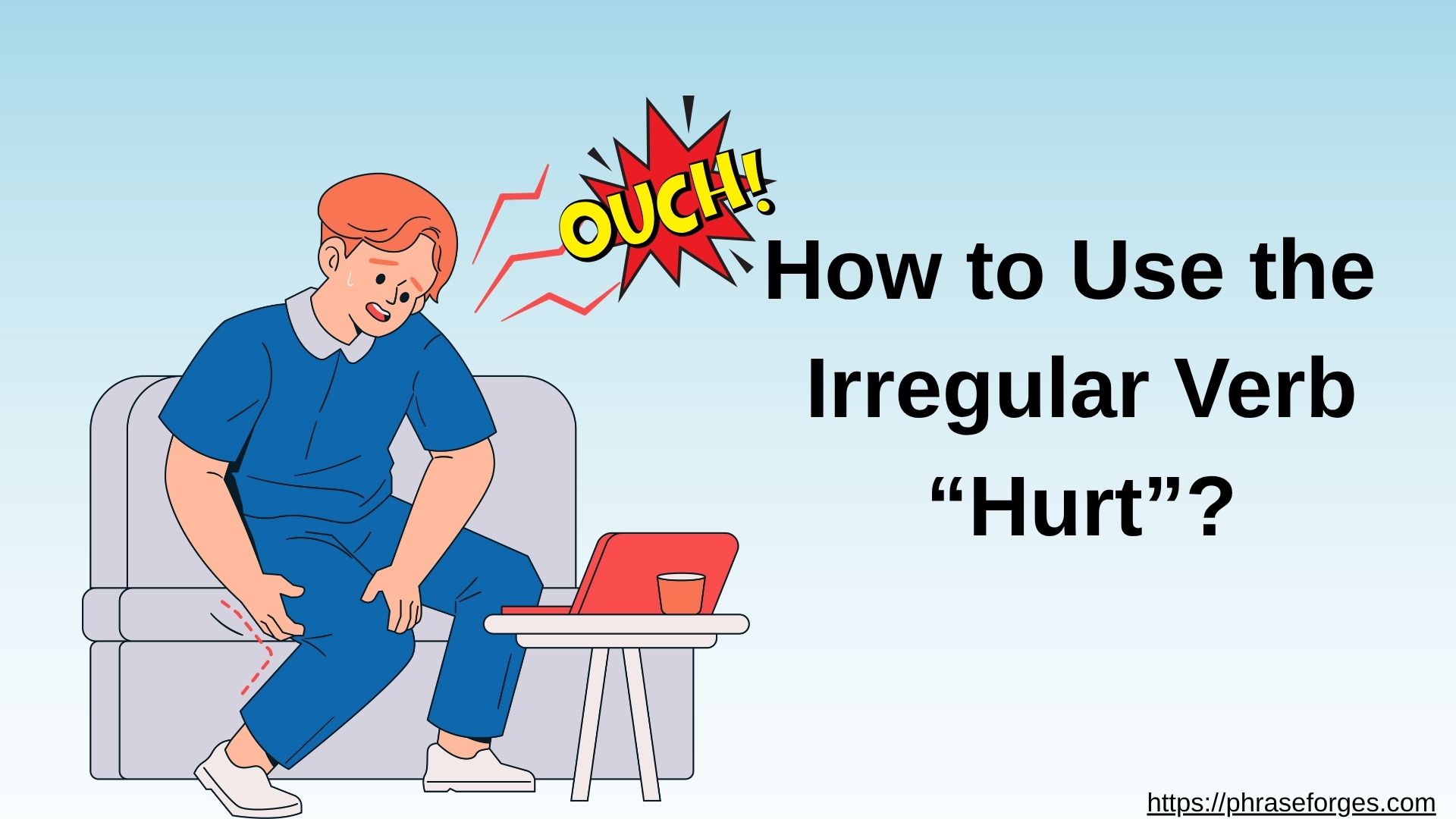The verb “hurt” is one of those fascinating irregular verbs in English that does not change form between the present tense, simple past tense, and past participle. Whether you’re describing physical pain (“I hurt my knee yesterday”) or emotional pain (“That comment really hurt me”), knowing how to use “hurt” correctly in different contexts will sharpen your writing and speaking.
This guide breaks down verb conjugation of hurt, clears up common errors (like “hurted”), and shows you how to use it naturally across tenses—with examples, email scenarios, and grammar tips you can apply instantly.
✅ Simple Definition + Usage Overview

The verb “hurt” means to cause pain, injury, or distress, either physically or emotionally. It’s an irregular verb without -ed endings, which means its forms don’t follow standard patterns. Instead, its base form, simple past, and past participle are all “hurt.”
For example:
- Present: “I hurt my arm during practice.”
- Past: “I hurt my arm yesterday.”
- Past Participle: “I have hurt my arm many times before.”
Notice how “hurt” stays the same in all these forms.
✅ Clear Rules & Patterns for “Hurt”
Here’s what makes “hurt” unique compared to other verbs:
- It’s part of a small group of verbs with one present and past tense form (like hit, shut, let).
- You don’t add “-ed” to form the past tense or past participle. (“hurted” is incorrect.)
- The meaning shifts slightly depending on context: physical injury, emotional pain, or figurative damage.
🔹 Conjugation Chart for “Hurt”
| Tense | Form of Hurt | Example Sentence |
|---|---|---|
| Base Form (Infinitive) | hurt | “I don’t want to hurt anyone’s feelings.” |
| Present Tense | hurt / hurts | “My feet hurt after running.” / “This cut hurts.” |
| Present Continuous | am/is/are hurting | “I’m hurting after the workout.” |
| Simple Past | hurt | “She hurt her ankle last night.” |
| Past Participle | hurt | “He has hurt himself multiple times.” |
| Past Perfect | had hurt | “I had hurt my wrist before the big game.” |
| Future | will hurt | “This will hurt if you’re not careful.” |
| Future Continuous | will be hurting | “By tomorrow, I’ll be hurting from all this exercise.” |
| Future Perfect | will have hurt | “By then, I’ll have hurt my chances of winning.” |
✅ Examples in Context: Physical and Emotional Hurt
“Hurt” works both literally and figuratively.
- Physical Pain: “I hurt my knee playing basketball.”
- Emotional Pain: “Her words hurt more than I expected.”
Email Scenario (Physical):
Subject: Need to Miss Practice
Hi Coach Daniels,
I’m writing to let you know I hurt my ankle during yesterday’s run. I’ll see the doctor tomorrow and update you on when I can return to training.
Thanks for understanding,
—Ryan
Email Scenario (Emotional):
Subject: I’m Sorry
Hi Jessica,
I realized my comment yesterday may have hurt your feelings, and I want to apologize sincerely. It wasn’t my intention, and I hope we can clear the air.
—Lena
✅ Common Mistakes & Fixes
❌ Mistake: Using “hurted”
Incorrect: “I hurted myself on the bike.”
✅ Correct: “I hurt myself on the bike.”
❌ Mistake: Confusing Past vs. Past Perfect
Wrong: “I hurt my back before the match started.”
Better: “I had hurt my back before the match started.”
(Use past perfect when one past action happens before another.)
❌ Mistake: Forgetting Continuous Forms
Many learners forget phrases like “I’m hurting”. These forms describe ongoing pain, either physical or emotional.
✅ Examples Across Tenses
Here’s how “hurt” appears in natural contexts:
- Present: “My teeth hurt when I eat ice cream.”
- Past: “I hurt my shoulder last week at the gym.”
- Present Perfect: “I’ve hurt myself doing this move before.”
- Past Perfect: “She had hurt her reputation long before the scandal.”
- Future: “If you touch that stove, it will hurt.”
- Future Continuous: “I’ll be hurting tomorrow from today’s hike.”
✅ Synonyms & Related Expressions
“Hurt” has many synonyms, depending on context:
- Physical: injured, wounded, sore, aching
- Emotional: upset, distressed, pained, heartbroken
- Figurative: damaged, impaired, weakened
For example:
- “I injured my knee” (physical)
- “Her words upset me” (emotional)
✅ Irregular Verbs Like “Hurt”

“Hurt” belongs to a group of irregular verbs without -ed endings, where the base form, past tense, and past participle remain identical.
Examples include:
- hit → hit → hit
- shut → shut → shut
- let → let → let
Learning this pattern makes it easier to recognize and avoid errors.
✅ Quick Reference Table: Verb Forms of “Hurt”
| Form | Word |
|---|---|
| Base Form | hurt |
| Simple Past | hurt |
| Past Participle | hurt |
| Present Participle | hurting |
✅ Key Takeaways
- “Hurt” never changes form in past tense or past participle.
- “Hurted” is incorrect.
- Use past perfect (had hurt) when one action precedes another in the past.
- It applies to both physical and emotional pain.
- Remember continuous forms: “I’m hurting,” “I’ve been hurting.”
By understanding these verb conjugations of hurt and practicing with real-life examples, you’ll avoid common mistakes and use it fluently across any tense.

